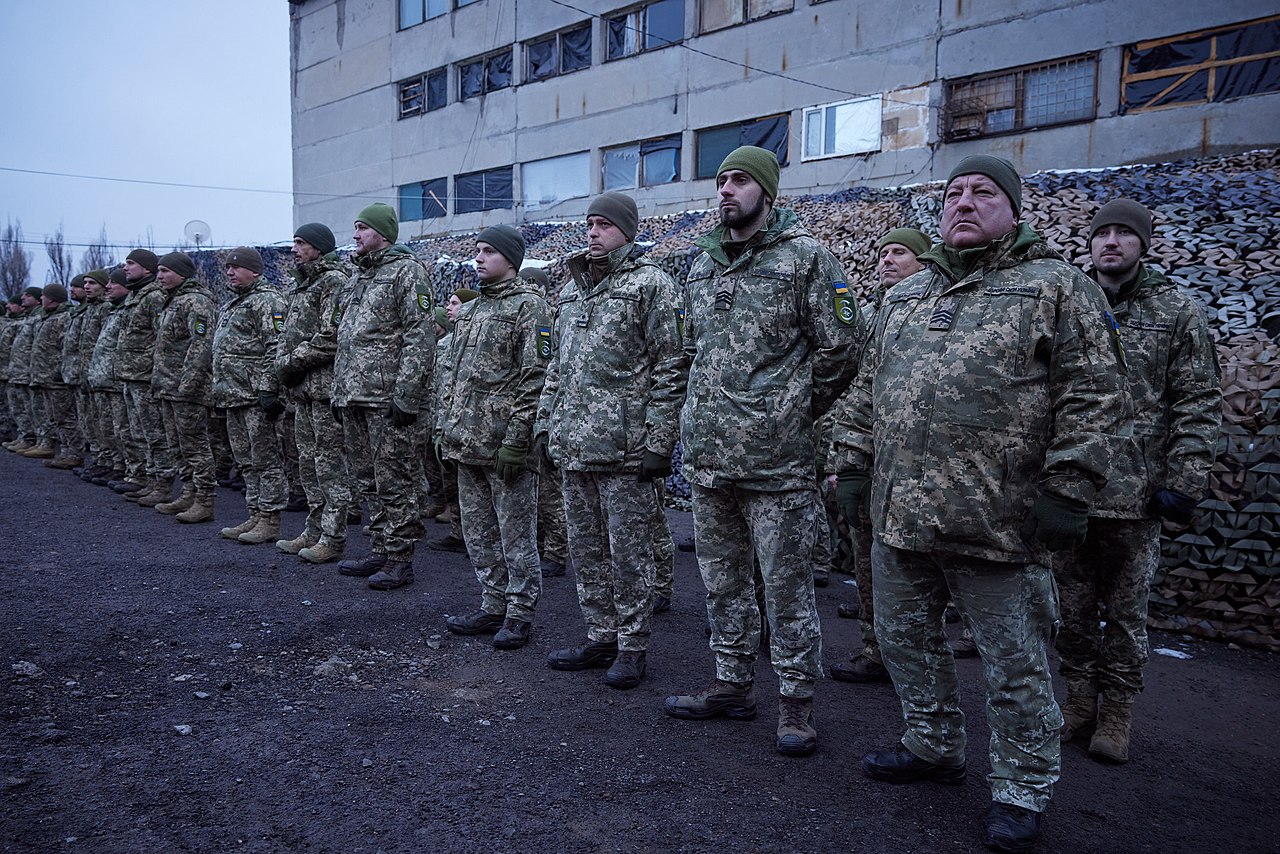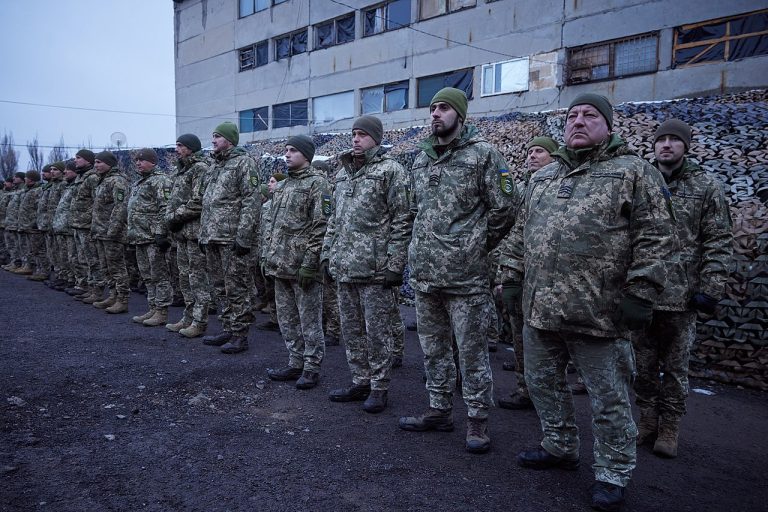Photo source: Wikimedia Commons 2023-12-06
Photo source: Wikimedia Commons 2023-12-06
At the very beginning of Russia’s full-scale invasion of Ukraine, adult men of conscription age constituted one-tenth of the total Ukrainian refugee population in the Czech Republic, a figure that has since risen to a quarter, totaling 93 thousand men. Similar patterns are evident in neighboring countries. This is despite the enforcement of martial law and general mobilization in Ukraine, which, in theory, restricts men aged 18 to 60 from leaving the country, save for a few exceptions. Some of the Ukrainian men who managed to leave the country used the services of those who disguise deserters as aid workers or facilitate their border crossing away from official checkpoints. Investiagace.cz delved into these smuggling networks for Ukrainian men and spoke with one of the smugglers.
This story’s Czech version was published on Investigace.cz.
The surge in the count of Ukrainian male refugees isn’t just confined to the Czech Republic; neighboring nations are experiencing a similar trend. In Germany, for instance, the proportion of Ukrainian refugees of working age who are men has tripled since spring 2022. Additionally, per the Polish daily Rzeczpospolita, around 80,000 Ukrainians eligible for conscription are currently in Poland.
The trend is also confirmed by the Ukrainian side. “Since the invasion, some 6,100 men have been caught at Ukraine’s border crossings trying to get out using counterfeit or fraudulently obtained permissions,” says Lieutenant Colonel Olena Trachuk, spokeswoman of the Chop detachment of Ukraine’s State Border Service. Chop, situated close to Ukraine’s border junction with Hungary and Slovakia, serves as an optimal gateway into Europe, as it refrains from sending Ukrainian defectors back to Ukraine. Presently, border guards prioritize apprehending individuals attempting to exit the country away from official border checkpoints. Since the start of the invasion, border guards have apprehended 13,600 individuals trying to get out via official checkpoints. Nonetheless, Olena Trachuk asserts that the actual count of Ukrainian men crossing the border illegally is significantly higher.
“Preserving their lives is my mission”
Vladimir, as he is known on Telegram (though the journalists who spoke with him are aware of his true identity), began smuggling Ukrainian men to Moldova, Romania, and onward to Europe after two of his friends died in battle. “Both felt like mere cannon fodder, realizing the futility of the war and wanting out. I was meant to assist them. But by the time I gathered the necessary contacts and resources, it was too late—they had both died,” shares the man who claims to be responsible for smuggling several hundred individuals, including soldiers, across the border during the conflict. “Soldiers are far more cooperative—they understand discipline and grasp the consequences of their actions, having experienced the horrors of war and understanding what truly instills fear,” he observes. According to him, civilians exhibit greater trepidation about crossing borders. “At times, I withhold certain details to prevent them from feeling overwhelmed and reconsidering. It’s my way of preserving their lives—that’s my mission,” he says firmly.
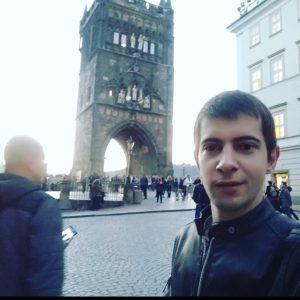
PICTURE TITLE: Part of a thank you note from satisfied smuggling clients is filmed on the streets of Prague. Source: Telegram
An investigator from investigace.cz came across the smuggler offering his services in a Facebook group for Ukrainian refugees in the Czech Republic. Details regarding transfer conditions, pricing, up-to-date information, and reviews from his previous clients can be found on his Telegram channel. Evidence suggests that some of his clients made it to the Czech Republic, as inferred from multiple video clips resembling thank-you notes from satisfied customers filmed on the streets of Prague. Other popular destinations include Poland and Germany, correlating with the surge of Ukrainian men in these countries.
The team at investigace.cz identified Vladimir’s true identity through his phone number and social networks. However, in adherence to an anonymity agreement, journalists opted against publishing this information. Vladimir is employed at a transport company that is based in Tiraspol, Moldova and has branches in Romania.
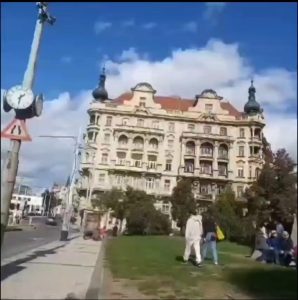
Part of a thank you note from satisfied clients is filmed on the streets of Prague. Source: Telegram
Russian-backed Transnistrian Moldovan Republic. Situated approximately an hour’s drive from the official border crossing with Ukraine, known as “Tudora,” this crossing serves as Vladimir’s route for transporting clients, whom he often disguises as aid workers. A passport photo stamped from “Tudora,” shared by one of his satisfied customers, serves as evidence. From Moldova, most refugees proceed onward to the European Union.
This is corroborated by Moldovan authorities’ statistics, which indicate that out of the 850,000 Ukrainians who crossed the Moldova-Ukraine border, one in eight chose to stay in Moldova. When asked why the smugglers are not directly crossing the Polish-Ukrainian border, Vladimir responds, “The Polish Border Guard collaborates with Ukraine on joint operations targeting illegal border crossings, leading to a significantly low success rate in crossing that border.”
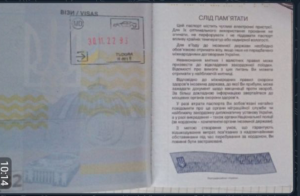
A photo of a passport stamped at the Tudora border crossing, taken by one of Vladimir’s clients. Source: Telegram
One cannot escape a war
A “legitimate” journey out of Ukraine—using falsified documents of an aid worker at the border crossing—comes with a price tag of $7,000. However, Volodymyr advises his clients to opt for “going underground,” crossing outside official checkpoints. “When you cross as an aid worker, your details get recorded in the system. If you fail to return to Ukraine within the stipulated time, legal issues arise upon your return. This risk is absent in an illegal crossing since you remain unknown,” he elaborates.
For an illegal car crossing in the so-called green zone, the cost is $4,500. Discounts vary based on the difficulty of the journey. “Walking a minimum of two kilometers amounts to $2,500. If you walk eight kilometers, the price reduces to $1,500,” Vladimir’s pricing list reads.
Payment is due only upon a successful border crossing, accepted in cash, cryptocurrency, or even “in kind,” such as the client’s car (if not needed by the client for the border crossing). When asked if clients sometimes fail to pay him, Vladimir confirms that this does sometimes happen. “It used to happen frequently—I had to handle all logistics and bribe specific individuals using my own funds, which isn’t cheap. That’s why I now require a deposit.”
At the same time, he acknowledges that those fleeing the country are mostly financially capable—they’ve either sold their assets or saved up. “The wealthiest fled during the initial days of the war. Only the most naive, indoctrinated patriots, or the economically disadvantaged enlist,” Vladimir remarks. He presently has no intentions of leaving the country. “At times, I contemplate it, but then I realize you can’t escape a war. I firmly believe the conflict will eventually expand into the Baltics, Moldova, and farther west.”
When questioned about the party accountable for the ongoing war in Ukraine, he responds with a personal theory rooted in his fascination with the occult. “The conflict stems from higher powers that surpass the interests of individuals and nations,” he conveyed in a private chat.
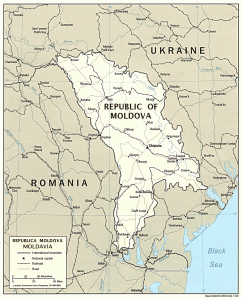
Moldova-Ukraine border, map. Source: Telegram
Don’t wait for winter—you’ll freeze
The timing of smuggling operations is significantly influenced by seasons—and the weather conditions they bring. With the onset of heavy rainy seasons, the quality of roads in the green zone deteriorates rapidly. “Regrettably, the roads we navigate are unpaved. Tire tracks on muddy paths are undesirable, so we must wait for the surface to dry. Please be prepared for this,” Vladimir advises potential clients. Dropping temperatures pose another challenge. “In freezing weather, waiting in one place becomes arduous. Take this into account and avoid scheduling trips for winter,” he cautions his clients.
However, those who successfully complete these journeys must keep their adventures discreet. ‘If you’re already abroad, learn to maintain secrecy. While you may face a maximum fine, we could end up in jail. We have families too. Only disclose information about us to civilians. Consider those who may need our assistance after your journey,” urges the smuggler. Despite these warnings, Vladimir mentions occasional attempts by officers from the Ukrainian secret service to disrupt his operations. On his channel, he frequently shares photos and identity documents of individuals purportedly exposed as agents. The investigative team for this report hasn’t managed to verify whether these individuals are genuinely involved or have been associated with Ukrainian secret services.
Vladimir’s smuggling enterprise faces threats not only from sporadic attempts by SBU agents to disrupt his logistical operations but also from stiff competition within the black market. Another Telegram channel provides similar services at prices significantly lower. For instance, authorization to exit the country through the Shlyakh system, explained in the following paragraph, costs $700—up to ten times less than what his competitors charge. However, Vladimir firmly believes that only scammers offer such remarkably low rates, claiming anyone actually charging such prices would be operating at a loss. Moreover, rival smugglers propose payment in installments by deducting 12 percent of the salary from a purported new job they promise to secure for the client. Vladimir arranges employment opportunities on-site for his clients in Latvia, Estonia, Poland, Germany, and the Czech Republic as well. “Unfortunately, these aren’t high-end jobs—mostly in construction sites or manufacturing,” he remarks.
One way to go
“Shlyakh” translates to “journey” in Ukrainian. Following the declaration of general mobilization in March 2022, Ukrainian authorities introduced a registration system under this name. Its purpose was to streamline border crossings for long-distance drivers and aid workers. Official data as of early July indicates that 254,000 individuals have acquired this form of border crossing permit, including almost 150,000 drivers who work in transportation. Each time a new border crossing occurs, the permit holder is required to submit a fresh application to the authorities.
The remaining 104,000 individuals are drivers engaged in transporting humanitarian aid. However, their applications for approval necessitate a permit from either the Ministry of Infrastructure or regional military administrations. This authorization is granted based on the validation of documents confirming their association with the relevant humanitarian organization. The difference between the two groups is that long-distance drivers use the electronic application system, while volunteers in the latter category submit their applications in paper form.
Illicit trading of permits emerged shortly after the introduction of the ‘Shlyakh system. Serhiy Kozyr, a Ukrainian MP from the Servants of the People party, highlighted that nearly 19,000 Ukrainian men eligible for conscription fled abroad within the system’s initial year. The system, or rather a notable case of abuse of the system, sparked public outcry during the onset of the war in March 2022: Twenty-nine-year-old Ihor Portnov, the son of pro-Russian politician Andriy Portnov, left the country with permission granted by the Lviv Regional Military Administration, responsible for processing regional applications. However, investigations revealed that the accompanying NGO letter supporting his exit request was forged. Andriy Portnov himself left the country two months after his son’s departure, intensifying the controversy surrounding the system’s abuse.
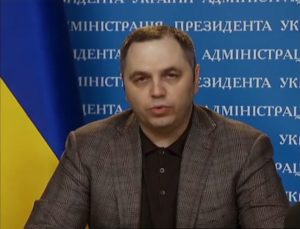
Andriy Portnov, politician. Source: Youtube
Fake NGOs and their shareholders
According to investigations by the Ukrainian investigative project NGL Media, a significant number of Ukrainian NGOs that obtained permits for their drivers only came into existence shortly after the war commenced. The activities of these NGOs are often untransparent or entirely unknown. Notably, all these organizations share the commonality of having their applications approved by the same authority: the Lviv Regional Military Administration (RMA).
According to reports, one of the most prolific applicants for exit permits is the charitable foundation Chisty Kyiv, which facilitated the departure of 385 individuals abroad. The Lviv administration regards it as one of its primary humanitarian partners. Despite the foundation’s establishment in 2020, it only initiated a presence on social media towards the end of 2022 and has, to date, only published a few posts.
The foundation asserts that it has transported over 1,500 tons of humanitarian aid across the border, yet no verifiable records of these activities exist in open sources. Additionally, certain volunteers who acquired exit permits through this organization have questionable backgrounds. For instance, in May 2022, a resident of Starosambirskyi district named Ivan Mochulskyi who had four previous convictions and is presently on the wanted list managed to leave owing to this permit—and never came back.
Adding to this, Maksym Tkachyk, the head and founder of the Chisty Kyiv Foundation, also left the country in August using a permit acquired from the same Lviv RMA office handling exit permits.
Another case involves the charity organization Nashi dobri spravy, established in autumn 2022, which secured exit permits for 270 men within nine months. Several dozen of these individuals have not returned. Curiously, this organization lacks a website or social media presence, and information about it is notably absent in the media. It is supposedly headquartered in a building that, according to the Ukrainian land register, doesn’t exist. “Nashi dobri spravy” is registered in the name of Ievhen Serhiiovych Korchynskyi from Ivankiv settlement in Kyiv region, but such a person doesn’t formally exist either.
Lastly, there’s the Bayraktar Foundation in Kiev, responsible for sending 220 men abroad. Founded by nineteen-year-old Denys Synjavskyi last summer, Synjavskyi is now under investigation for suspected illegal smuggling of individuals across the state border. Court records indicate that the alleged aid workers paid an undisclosed Lviv RMA employee $2,500 per person to approve their applications in the ‘Shlyakh system.
In the safety of the European Union
NGL Media’s journalists have identified over two thousand applicants—men of conscription age—who, like Portnov Jr., acquired permits from the Lviv RMA but did not return to Ukraine. They’ve also uncovered dozens of NGOs involved in this fraudulent scheme. The journalists lack information about these men’s current whereabouts. “Regrettably, tracking their movements is beyond our capacity. Our knowledge is limited to the border crossing they used when leaving the country,” says Oleksandra Hubytska, head of the project.
Avoiding conscription is a criminal offense in Ukraine, carrying a penalty of three to five years in prison. So far, Ukrainian authorities have primarily focused on prosecuting those who avoided the draft but remained in the country, as they are more easily accessible to law enforcement. Locating those who have already left presents significant challenges. For instance, the Czech Republic announced it won’t extradite Ukrainian men who fled mobilization.
“To date, the Ministry of Justice hasn’t received any extradition requests of this nature from Ukrainian judicial authorities. Extradition involves meeting specific conditions, evaluated case by case according to applicable laws and precedents by Czech judicial authorities,” states Marcela Nevšímalová from the ministry’s press department.
Nonetheless, the smugglers themselves face greater risk than military duty deserters. If apprehended, they could face a prison sentence of seven to nine years in Ukraine.

